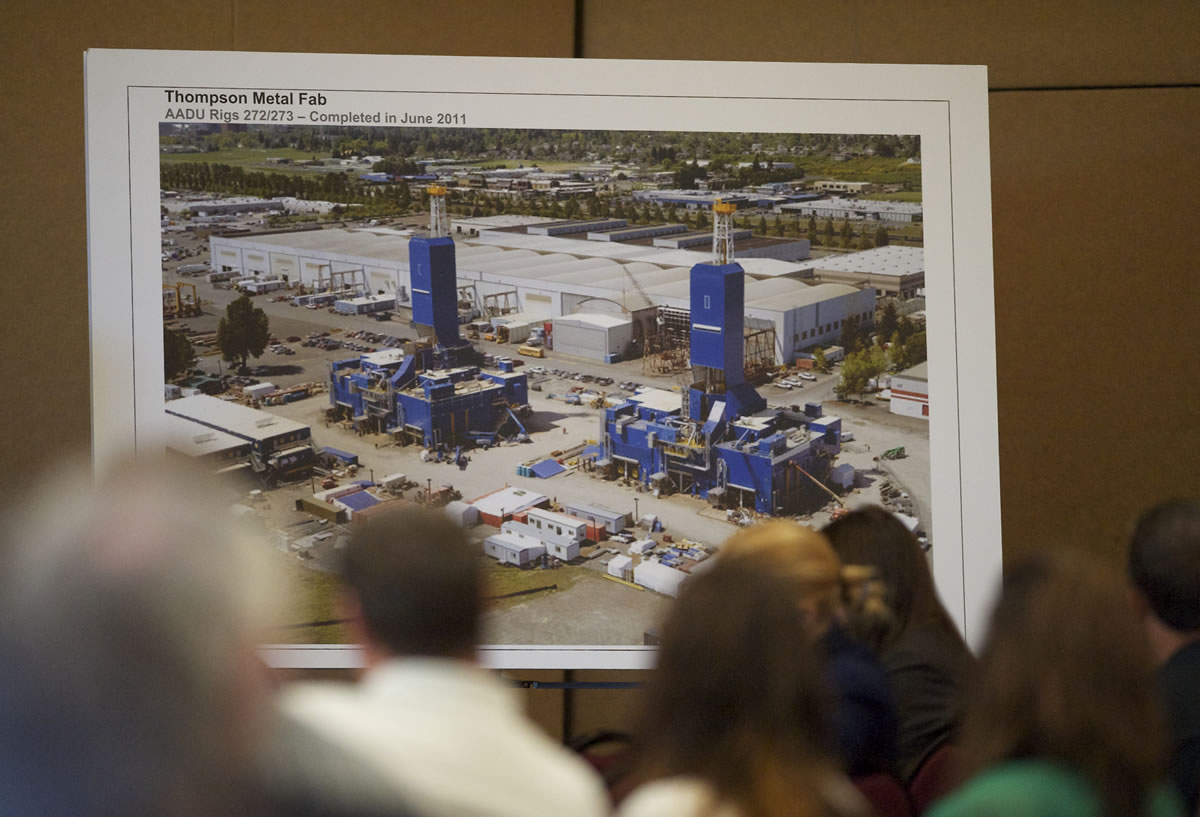Wednesday’s Coast Guard meeting begins at 5 p.m. in the Hilton Vancouver Washington, 301 W. Sixth St.
CRC reaches mitigation deal with two manufacturers
The federal agency that essentially holds veto power over the Columbia River Crossing opened its ear to Portland and Vancouver residents Tuesday, and most who spoke called for a rejection of the controversial megaproject.
In the first of two hearings hosted by the U.S. Coast Guard, much of the testimony focused on the proposed Interstate 5 Bridge replacement’s planned 116-foot bridge height, a clearance more than 60 feet lower than the existing twin drawbridges allow over the Columbia River. The $3.4 billion project would permanently limit navigation on the river, and limit future development and commerce upstream of the new span, opponents said.
The CRC as planned “literally cuts this river in half,” said William “Chris” Girard, president of Plaid Pantry convenience stores and a CRC critic.
The Coast Guard is mulling whether to approve a crucial bridge permit the CRC must have to move forward. The project filed its bridge permit application in January. Told by the Coast Guard that they hadn’t submitted enough information, CRC officials sent additional documents in April.
Coast Guard officials have said their job is to protect the “reasonable needs” of navigation on the Columbia River. The agency is aiming to make its decision on the CRC by Sept. 30.
Public comment on the bridge permit formally kicked off last month, and will continue through June 20. By Tuesday afternoon, the Coast Guard had received more than 140 written comments online — the vast majority of them urging officials to reject the CRC as planned.
Tuesday’s speakers touched on a wide range of issues, from economic impacts to the turning basin barges must navigate between the I-5 bridge and the railroad bridge just downstream.
Supporters said the CRC will be a boon to the region, even if it brings some short-term harm.
“There is a huge ripple across the pond that goes well outside of Clark and Multnomah counties,” said Tony Vasquez, one of several local union members who turned out in favor of the project.
A total of 42 people spoke directly to the Coast Guard during Tuesday’s meeting at Portland’s Red Lion Hotel on the River, most of them against the CRC. Dozens more attended but didn’t speak.
Upriver impacts
The CRC would reduce the maximum river clearance under the freeway, building a fixed span 116 feet above water during a low river level. The current I-5 Bridge allows 178 feet of head room when lifted.
Project officials have said the 116-foot height would be enough for almost all current river users. But it’s not high enough for three major upriver manufacturers — Thompson Metal Fab, Greenberry Industrial and Oregon Iron Works — whose largest products wouldn’t fit under the proposed bridge. State officials on Tuesday announced mitigation agreements with Greenberry and Oregon Iron Works, but didn’t disclose details of those deals.
At Tuesday’s meeting, Thompson President John Rudi said relocating his company downstream of the new bridge is the only way to satisfy its current and future needs. But negotiations between Thompson and the CRC remain “far apart” on the need to maintain the company’s navigation and ultimate survival, Rudi said.
Thompson has said it supports the CRC — as long its impacts are properly mitigated. But other attendees said Tuesday that short-term compensation won’t solve the long-term issue of reduced access and potential upriver opportunities.
The bridge permit decision will ultimately come from Coast Guard headquarters in Washington, D.C., after a recommendation from the agency’s District 13 office in Seattle. Brian Dunn, chief of the Coast Guard’s Office of Bridge Programs in Washington, D.C.,attended Tuesday’s hearing and will be at Wednesday’s session.
Eric Florip: 360-735-4541; http://twitter.com/col_enviro; eric.florip@columbian.com.




